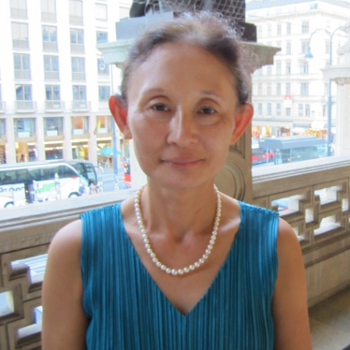In Die Walküre, the second opera in this revival of Guy Cassiers’ Ring at Staatsoper Berlin, there are no dancers to shadow the singers or act as props. The staging is more three-dimensional than Rheingold, with half a cube-like structure mid-stage to represent the inside of Hunding’s hut in Act 1, statues of horses caught in motion in Act 2, and somewhat awkward steps of various heights in Act 3. A series of poles descend from the ceiling as trees in the Second Act. Thin red ropes add the color of death for Siegmund, Hunding and for the slain heroes. Projections are effective, the forest in green, fire in red. The Valkyries sing as a projected image of a single horse rears up surrounded by dead and dying heroes. In her sleep, Brünnhilde is hoisted on a pedestal surrounded by candles circling above her as the last note of the Fate motif fades.
A standing ovation is a rare event in Germany, where prolonged applause signals audience enthusiasm. Singing Wotan, Michael Volle elicited a roar of applause from seasoned Wagnerians, who rose to their feet at his solo curtain call. His timbre is relatively light for the role and yet the voice has enough flexibility for him to essay the low-lying Act 2 monologue, where many a Wotan becomes inaudible, with clarity and nuance. Wotan’s “Abschied” in Act 3 was sung with a combination of beauty, power, regret and sadness while Volle maintained his signature style of sustained legato, resonance and crystal clear diction. His acting was that of an angry and frustrated god, but there was enough gravitas, tenderness and sorrow in his interaction with Brünnhilde to make it clear that this is perhaps the most decisive moment of the whole Ring story. His splendid portrayal will no doubt continue to grow and evolve, a cause for celebration.
Another star of the evening was Anja Kampe, who showed us that she is indeed the reigning Sieglinde of our time. The voice is warm, rich and has a bit of a flutter that enhances the role’s fate as an unhappy wife, an ecstatic sister/bride and, finally, an expectant mother. A natural actress with large expressive eyes and strong presence, she acted and sang with commitment and energy. Her celebration of the gift to the world, “O hehrstes Wunder!” in Act 3, was a heartfelt and beautiful highlight to remind us of what is to come at the end of the Ring. Iréne Theorin, an experienced Brünnhilde, was another pillar of a successful evening, her bright soprano cutting through Wagner's thick orchestration to project a proud and yet vulnerable woman. Another crucial scene of the opera, Act 2 Todesverkündigung was a hushed dialogue of tender sadness thanks to Theorin and Simon O’Neill, a clean-voiced and sincere Siegmund. Falk Struckmann was a robust but elegant Hunding, a perfect foil to the Wälsung twins. Ekaterina Gubanova’s well-sung Fricka never seemed to lose control of her emotions, neither very angry nor sarcastic. The eight Valkyries, looking encumbered by their voluminous gauzy dresses, added to the excitement of the evening leading to the emotional confrontation of Wotan and his favorite daughter.
All of the fine singing and acting of the evening, however, was led and supported by splendid performance of the Staatskapelle Berlin under the superb leadership of Daniel Barenboim. One got a sense of the arc of the narrative of the opera overall, not a series of scenes and episodes. His control of dynamics was a marvel, with singers given freedom and ease to ride upon the music. Volle and Kampe were particularly remarkable in their ability to be in synch with the underlying music. Even when Barenboim increased the volume in orchestral passages, he never went for bombastic loudness. The brass was subdued and well tempered, low strings sang with joy and sorrow. It was a happy evening: one of Wagner’s masterpieces realized with insight, care and love.




